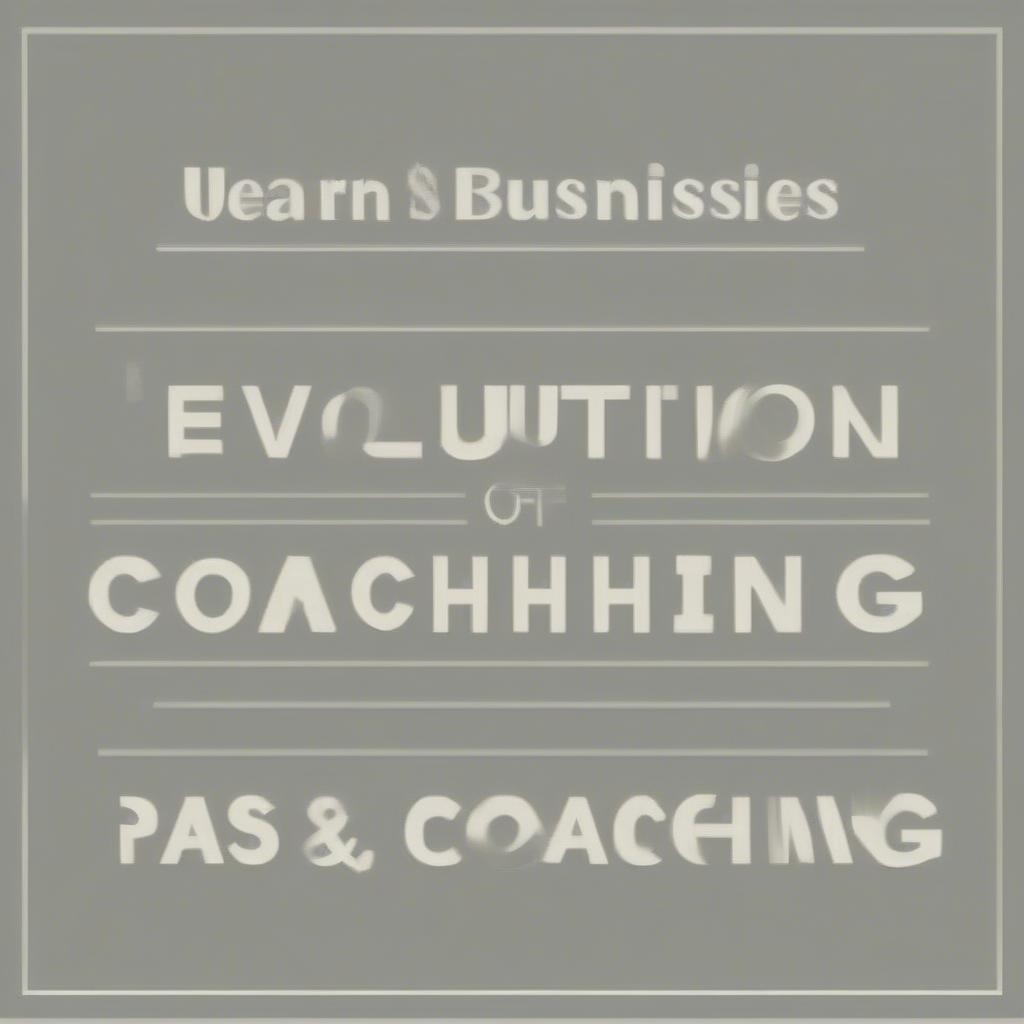
Growing a coaching practice is an exhilarating journey, filled with the promise of helping others and achieving your own entrepreneurial dreams. However, like any business venture, it comes with its own set of legal considerations. Navigating these legalities can feel daunting, but understanding them is crucial for safeguarding your business and ensuring its long-term success. This article serves as your comprehensive guide, offering legal tips and practical advice to help you build a thriving and legally sound coaching business.
Laying the Foundation: Essential Legal Structures
Before you even think about attracting clients, you need to establish a solid legal foundation. Choosing the right business structure is a fundamental first step. This decision will impact your personal liability, taxation, and overall business operations.
Sole Proprietorship: Simplicity with Responsibility
A sole proprietorship is often the easiest structure to set up. It means you and your business are legally one and the same.
- What it is: You’re the owner, and you directly receive all the profits. You also shoulder all the debts and liabilities.
- Why it’s chosen: Simple and inexpensive to establish, minimal paperwork.
- When it’s suitable: Ideal for a new coaching business with low risk and limited financial resources.
- Potential Drawbacks: You’re personally liable for all business debts, meaning your personal assets can be at risk.
- Example: If a client sues you for breach of contract, your personal savings could be used to cover any resulting costs.
Limited Liability Company (LLC): A Protective Shield
An LLC offers more protection than a sole proprietorship by separating your personal assets from your business liabilities.
- What it is: A hybrid structure that combines elements of a partnership and a corporation.
- Why it’s chosen: Limited personal liability, flexible taxation options, and relatively easy to set up.
- When it’s suitable: Ideal for coaching businesses looking to protect their personal assets as they grow.
- Benefits: If your business incurs debt or is sued, your personal assets are typically protected.
- Example: If your business owes money to a vendor, the vendor cannot seize your personal car or house.
S-Corporation: Potential Tax Advantages
An S-Corporation (S-Corp) is a more complex structure that can offer significant tax advantages.
- What it is: A business structure that allows profits and losses to be "passed through" to the owner’s personal income tax.
- Why it’s chosen: Potential for reduced self-employment taxes, more complex and requires more ongoing compliance.
- When it’s suitable: Ideal for established, profitable coaching businesses.
- Key Consideration: Requires more administration, including filing corporate tax returns.
- Example: As your business profits increase, this structure can help you save on self-employment taxes.
Choosing What’s Right For You
The best structure depends on your individual circumstances and business goals. Consult with a legal and financial professional to determine the most appropriate option for your specific situation.
Actionable Tip: Research your state’s specific requirements for each business structure, as regulations vary.
Protecting Your Intellectual Property: Safeguarding Your Coaching Methods
Your unique coaching methods, programs, and content are valuable assets. Protecting them is crucial for maintaining your competitive edge.
Copyright: Protecting Original Works
Copyright automatically protects your original creations, like written materials, videos, and logos.
- What it is: Legal protection granted to the creators of original works of authorship.
- Why it’s important: Prevents others from copying or using your work without your permission.
- What it covers: Written materials (workbooks, blog posts), videos, training modules, your logo.
- How to secure: No formal registration is required for automatic protection. For enhanced legal protection, register with the US Copyright Office.
- Example: Your unique coaching framework, including the steps, activities, and worksheets, is copyrightable.
Trademarks: Branding Your Coaching Business
Trademarks protect your business name, logo, and other brand identifiers.
- What it is: Legal protection for words, symbols, or designs used to identify your brand and distinguish your goods or services from others.
- Why it’s important: Prevents others from using similar branding that could cause confusion among your clients.
- What it covers: Your business name, logo, slogans, and other identifiers specific to your coaching business.
- How to secure: Search for conflicting trademarks before application and register with the US Patent and Trademark Office.
- Example: Your distinctive coaching business name and your stylized logo should be trademarked.
Trade Secrets: Confidential Coaching Strategies
Trade secrets protect confidential business information that provides you with a competitive advantage.
- What it is: Confidential information, like specific processes, methods, or client lists, that provide a competitive edge.
- Why it’s important: Helps protect your proprietary processes and strategies.
- What it covers: Specific techniques, internal processes, or client lists not generally known.
- How to secure: Implement strict confidentiality protocols for employees and partners.
- Example: Unique methods you’ve developed to help clients achieve breakthroughs, kept secret within your practice.
Actionable Tip: Conduct regular audits of your content and processes to ensure ongoing intellectual property protection.
Contracts and Agreements: Clarity is Key
Clear, legally sound contracts are the cornerstone of a successful coaching practice. These agreements define the scope of your services, protect both you and your clients, and minimize the risk of disputes.
Client Agreements: Defining the Coach-Client Relationship
A client agreement outlines the terms of your engagement with clients.
- What it is: A legally binding contract that clearly defines the services you will provide, payment terms, and other relevant details.
- Why it’s important: It minimizes misunderstandings, provides clarity, and establishes expectations.
- What it covers:
- Scope of services: What you will provide and what you will not provide.
- Payment terms: Pricing, payment schedules, cancellation policies, and refunds.
- Confidentiality: How you will handle client data and protect their privacy.
- Cancellation and termination: Your policies on client cancellations and terminating the engagement.
- Liability limitations: Clarify the limit of your liability.
- Intellectual Property: Ownership of any material created during the coaching sessions.
- Governing Law: Which state’s laws will govern the agreement.
- How to create: Consult with a lawyer specializing in business agreements to create a template that suits your needs.
- Example: If you are offering a six-month coaching package, the client agreement would outline the number of sessions, the focus of each session, payment details, and confidentiality practices.
Non-Disclosure Agreements (NDAs): Protecting Confidential Information
An NDA protects sensitive information shared with employees, contractors, or collaborators.
- What it is: A legal agreement that prevents recipients of confidential information from disclosing it to others.
- Why it’s important: It protects your proprietary methods, processes, and client information.
- When to use: When sharing proprietary business information with contractors, assistants, or other collaborators.
- What it covers: What information is considered confidential, how it can be used, and penalties for breach.
- How to create: Consult with a lawyer to create a robust NDA that is tailored to your specific needs.
- Example: If you hire a virtual assistant to manage your client data, an NDA will prevent them from disclosing that information.
Independent Contractor Agreements: Clarifying Roles and Responsibilities
If you work with contractors, a formal agreement will clarify expectations.
- What it is: A contract between your business and an individual contractor who is not an employee.
- Why it’s important: To distinguish independent contractors from employees and protect you from liabilities.
- When to use: When hiring assistants, specialists, or other collaborators on a project basis.
- What it covers: Scope of work, payment terms, timelines, intellectual property ownership, and termination clauses.
- How to create: Consult with a legal professional to ensure the agreement complies with relevant laws.
- Example: If you hire a graphic designer to create your marketing materials, this agreement will clarify their duties, how and when you will pay them, and who owns the copyrights to the final designs.
Actionable Tip: Have all contracts reviewed by a legal professional to ensure they are legally sound and protect your business.
Privacy and Data Protection: Client Information is a Treasure
Handling client data responsibly is crucial for maintaining trust and avoiding legal issues.
Privacy Policy: Transparency with Clients
A privacy policy explains how you collect, use, and protect client data.
- What it is: A public document that outlines how you collect, use, and protect your clients’ personal information.
- Why it’s important: It builds trust with your clients and complies with privacy regulations like GDPR and CCPA.
- What it covers: What information you collect, how you use it, how you protect it, and clients’ rights regarding their data.
- How to create: Seek legal guidance or use a professional template to create a compliant privacy policy.
- Example: Explain clearly in your privacy policy how you store client email addresses and how you protect their personal information.
Compliance with Data Protection Laws
Understanding data protection laws, such as GDPR in Europe and CCPA in California, is crucial.
- What they are: Regulations that protect the privacy of individuals’ personal information.
- Why they’re important: Non-compliance can lead to significant penalties.
- Key elements:
- Consent: Obtain explicit consent before collecting and processing data.
- Data minimization: Collect only necessary data.
- Security: Implement robust security measures to protect data from unauthorized access.
- Transparency: Be transparent with your clients about your data handling practices.
- How to achieve: Regularly review and update your privacy policy, data collection methods, and security measures.
- Example: If your client is located in California, you must comply with CCPA regulations.
Data Security Practices
Implement robust security measures to protect client data.
- What it is: Using systems and processes to protect information from unauthorized access and loss.
- Why it’s important: To prevent data breaches and protect your clients’ sensitive information.
- How to achieve: Use secure passwords, encrypt sensitive data, backup data regularly, and use secure platforms for communication.
- Example: Use strong passwords, avoid public Wi-Fi for sensitive information, and use cloud services with strong security measures.
Actionable Tip: Stay informed about the latest changes in data privacy laws and adapt your practices accordingly.
Insurance and Liability: Protecting Your Business from the Unexpected
Accidents and unexpected events happen. Insurance and liability management are key to safeguarding your business.
Professional Liability Insurance: Protecting from Claims
Professional liability insurance, also known as errors and omissions insurance, covers you if you make a mistake or are accused of negligence.
- What it is: Insurance that protects you against claims of professional negligence, errors, or omissions.
- Why it’s important: In case a client claims that your coaching led to damages, this insurance can cover legal expenses and payouts.
- What it covers: Legal expenses, settlements, or judgments resulting from claims of negligence, errors, or omissions.
- How to obtain: Research and compare different insurance providers to choose coverage that suits your practice needs.
- Example: If a client sues you for offering inaccurate advice that caused them to make poor decisions, this insurance can protect you.
General Liability Insurance: Covering Basic Risks
General liability insurance covers common risks, such as property damage or bodily injury.
- What it is: Insurance that protects you against claims for bodily injury or property damage caused by your business.
- Why it’s important: Can cover you if someone gets injured at your office or if your business causes damage to someone else’s property.
- What it covers: Bodily injury, property damage, or advertising injury caused by your business operations.
- How to obtain: Shop around for different policies to find a good fit.
- Example: If a client visits your office and slips and falls, this insurance would cover any medical expenses and potential liability.
Other Important Insurances
Depending on the scope of your business, consider other insurance policies like business owner’s policy (BOP), health insurance, workers’ compensation insurance (if you have employees), and cyber liability insurance.
Actionable Tip: Review your insurance policies annually to ensure they provide adequate coverage for your evolving business needs.
Learn Business: Supporting Your Growth Journey
Navigating the legalities of a coaching business can be complex. This is where Learn Business can be your invaluable partner.
How Learn Business Helps
Learn Business supports entrepreneurs, including coaches, by offering guidance, templates, and resources tailored to their unique needs.
- Coaching Specific Templates: Ready-to-use templates such as client contracts, NDAs, independent contractor agreements, and privacy policies, designed specifically for coaching businesses.
- Legal Guidance: Access to expert legal advice for coaching-related issues, contracts, and compliance, helping you stay ahead of any potential issues.
- Business Growth Resources: Insights into effective business growth strategies, marketing, and operational efficiency, ensuring your coaching practice thrives.
- Community and Networking: Opportunities to connect with other entrepreneurs, coaches, and business experts.
- Personalized Advice: Tailored advice for your specific coaching business structure, goals, and challenges.
The Benefits of Learn Business
Partnering with Learn Business can help you:
- Save Time and Money: Avoid costly legal mistakes by accessing ready-made templates.
- Reduce Stress and Anxiety: Feel confident knowing you have access to expert advice and guidance.
- Focus on Your Strengths: Spend more time on what you love – coaching your clients and growing your business.
- Accelerate Your Growth: Access tools and resources to help you grow your business faster and more sustainably.
Actionable Tip: Explore Learn Business resources today to take the guesswork out of the legal aspects of your coaching business and focus on achieving your goals.
Conclusion: A Legally Sound Future for Your Coaching Practice
Building a thriving and legally sound coaching practice requires careful planning, ongoing attention to detail, and a commitment to best practices. From choosing the right business structure to protecting your intellectual property and complying with data protection laws, every decision you make can have a significant impact on your success.
By following the legal tips outlined in this article, implementing robust contracts, and using resources like Learn Business, you can build a successful and sustainable coaching business. Remember, while focusing on the human aspect of your work is crucial, equally important is a strong foundation that protects your business, your clients, and your future. Stay proactive, stay informed, and you’ll create a successful and legally sound coaching practice that you can be proud of.



Leave a Reply